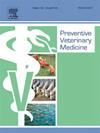Awareness and risk perception of bovine brucellosis among subsistence and medium-large scale farmers, and veterinarians: Insights from focus groups in Ecuador
IF 2.4
2区 农林科学
Q1 VETERINARY SCIENCES
引用次数: 0
Abstract
Bovine brucellosis is a zoonotic disease that poses significant risks to both livestock and humans, particularly those who come into contact with infected animals or consume unpasteurized dairy products. This disease is enzootic in Ecuador. Although previous studies have primarily examined its prevalence, there is limited understanding of veterinarians' perceptions of the issue and the awareness levels among cattle farmers regarding the associated risks. In this study, we used qualitative methods to examine the perception of bovine brucellosis control among veterinarians in Ecuador, as well as the awareness levels and risk perception of subsistence and medium and large-scale farmers regarding the disease. Four focus groups, two with veterinarians and two with cattle farmers were held between March and May 2022, involving veterinarians from eight Ecuadorian provinces working for the public, private, and academic sectors, as well as subsistence-scale farmers from an indigenous community in the highlands, and medium- and large-scale farmers in the coastal region. The findings showed that veterinarians believe farmers have limited knowledge about brucellosis and are unaware of the health risks associated with this disease. They also identified obstacles related to enforcing current laws, insufficient resources for health education, operational limitations of health organizations, and a lack of incentives for participating in the brucellosis control program. Subsistence- and medium and large-scale farmers displayed a low level of knowledge about brucellosis and limited awareness of associated risks. Risky livestock practices harmful to both animal and human health were also noted among these farmers. Socio-cultural factors, age, educational level, and gender were identified as barriers to accessing technology and information about bovine brucellosis prevention.
自给和中大型农民以及兽医对牛布鲁氏菌病的认识和风险认知:来自厄瓜多尔焦点小组的见解
牛布鲁氏菌病是一种人畜共患疾病,对牲畜和人类,特别是与受感染动物接触或食用未经巴氏消毒的乳制品的人构成重大风险。这种疾病在厄瓜多尔是地方性的。虽然以前的研究主要是调查其流行程度,但对兽医对这一问题的看法以及养牛户对相关风险的认识水平的了解有限。在本研究中,我们采用定性方法调查了厄瓜多尔兽医对牛布鲁氏菌病控制的认知,以及自给和中大型养殖户对该疾病的认识水平和风险认知。在2022年3月至5月期间举行了4个焦点小组,其中2个是兽医小组,2个是养牛户小组,参与者包括来自厄瓜多尔8个省的兽医,他们分别为公共、私营和学术部门工作,以及来自高地土著社区的自给自足的农民,以及沿海地区的中大型农民。调查结果表明,兽医认为农民对布鲁氏菌病的了解有限,并且不了解与该疾病相关的健康风险。他们还确定了与执行现行法律、卫生教育资源不足、卫生组织的业务限制以及缺乏参与布鲁氏菌病控制规划的激励措施有关的障碍。自给自足和中、大规模农民对布鲁氏菌病的知识水平较低,对相关风险的认识有限。在这些农民中还注意到有害于动物和人类健康的危险畜牧做法。社会文化因素、年龄、教育水平和性别被确定为获得有关牛布鲁氏菌病预防的技术和信息的障碍。
本文章由计算机程序翻译,如有差异,请以英文原文为准。
求助全文
约1分钟内获得全文
求助全文
来源期刊

Preventive veterinary medicine
农林科学-兽医学
CiteScore
5.60
自引率
7.70%
发文量
184
审稿时长
3 months
期刊介绍:
Preventive Veterinary Medicine is one of the leading international resources for scientific reports on animal health programs and preventive veterinary medicine. The journal follows the guidelines for standardizing and strengthening the reporting of biomedical research which are available from the CONSORT, MOOSE, PRISMA, REFLECT, STARD, and STROBE statements. The journal focuses on:
Epidemiology of health events relevant to domestic and wild animals;
Economic impacts of epidemic and endemic animal and zoonotic diseases;
Latest methods and approaches in veterinary epidemiology;
Disease and infection control or eradication measures;
The "One Health" concept and the relationships between veterinary medicine, human health, animal-production systems, and the environment;
Development of new techniques in surveillance systems and diagnosis;
Evaluation and control of diseases in animal populations.
 求助内容:
求助内容: 应助结果提醒方式:
应助结果提醒方式:


